Learn More About this Programme
This Webinar is part of a 7-Module series. You can find out more about this programme here
Need More Help?
No problem. Drop us a line using our Contact form, and a member of our team will get back to you.
About this Activity
Join us for the third webinar in our IR series: Interventional Radiology at the Nexus of Liver Cancer and Emergency Hepatobiliary Care.
This in-depth clinical discussion is led by Professor Charles Sanyika and hosted by Dr Dale Creamer and will explore the expanding role of Interventional Radiology (IR) in both oncologic and non-oncologic hepatobiliary (HPB) care — especially in high-risk patients where surgery may not be viable.
Professor Sanyika, Head of Interventional Radiology at Wits Donald Gordon Medical Centre and Chairperson of SAFIRE, will outline how IR is providing safe, image-guided solutions in complex cases — from liver cancer to acute gastrointestinal bleeding.
Topics include transarterial therapies for hepatocellular carcinoma (TACE and TARE), visceral aneurysm embolisation, TIPS creation, and variceal bleeding control.
Dr Dale Creamer, Head of Interventional Radiology at Groote Schuur Hospital, will host the session and guide the conversation to highlight practical clinical takeaways. Expect rich case imaging, procedural snapshots, and expert commentary.
This session is proudly presented in partnership with Boston Scientific.
Register now to discover how IR is revolutionising liver and HPB care — offering alternative, life-saving treatments where surgery falls short.
This is precision medicine in action. Changing the game. Don’t miss it.
What You Will Learn
In this one-hour webinar, Professor Charles Sanyika and Dr Dale Creamer will explore the critical role of Interventional Radiology (IR) in both oncologic and emergency hepatobiliary (HPB) care.
1. Transarterial Therapies in Hepatocellular Carcinoma (HCC)
- Patient selection for TACE and TARE: understanding BCLC staging, liver function status, and portal vein considerations.
- Vascular rationale: how liver tumours derive blood supply and why this enables selective targeting.
- Procedural techniques:
- TACE – combining chemotherapy with embolisation
- TARE (Y-90) – targeted internal radiotherapy using microspheres
- Clinical outcomes and goals: tumour control, downstaging, and bridging to transplant.
- Common complications and how to manage them (e.g., post-embolisation syndrome, non-target embolisation).
- Integration with systemic therapies in a multidisciplinary setting.
2. Emergency Interventions in Gastrointestinal Bleeding
- Embolisation techniques for visceral aneurysms (e.g., splenic, hepatic, mesenteric).
- Management of variceal bleeding in portal hypertension:
- TIPS (Transjugular Intrahepatic Portosystemic Shunt)
- Sclerotherapy and coil embolisation
- Real case imaging and procedural examples, including embolised aneurysms and TIPS creation.
3. IR as a Life-Saving Alternative in High-Risk HPB Cases
-The value of IR as a minimally invasive solution in critically ill patients where surgery is not an option.
-Multimodal roles of IR across oncology, vascular, and emergency care.
-How IR contributes to improved patient outcomes, reduced hospital stays, and expanded treatment pathways.
Through real-world cases and expert insight, participants will gain practical knowledge of minimally invasive procedures that are transforming outcomes for high-risk and complex patients.
About Your Presenter

Professor Charles Sanyika is the Head of Interventional Radiology at Wits University Donald Gordon Medical Centre in Johannesburg.
He earned his MBChB from the University of Zimbabwe and trained in radiology at the University of Natal, Durban.
He is the President of the South African Interventional Society (SAINTS) and a founding member of the Society of African Interventional Radiology and Endovascular Therapy (SAFIRE).
He also serves on the executive committee of the Hepato-Pancreato-Biliary Association of Southern Africa (HPBASA), and is a member of the Cardiovascular and Interventional Radiological Society of Europe and the Society of Interventional Radiology. His special interests include hepatopancreatobiliary interventions, transplant interventions, and interventional oncology.
His contributions to IR continue to advance the field in South Africa and beyond.
About Your Host

Dr Dale Creamer is Head of Interventional Radiology at Groote Schuur Hospital, a senior lecturer at the University of Cape Town (UCT), and currently practices at UCT Private Academic Hospital.
He earned his MBChB from the University of KwaZulu-Natal and completed his MMed in Diagnostic Radiology at Stellenbosch University. In 2021, he was awarded the Fellowship of the College of Diagnostic Radiologists (FC Rad Diag). He then received a Fellowship in Interventional Radiology from the University of Calgary in 2022, during which he developed a special interest in women’s health.
Driven to advance the field locally, he is committed to establishing a sub-specialist training programme in Interventional Radiology in South Africa.
About Your CPD Accreditation
This activity review is accredited for 1 Level 1 Clinical point on completion of at least 90% of this webinar.
HPCSA-registered healthcare professionals
On completion of both activities, HPCSA-registered healthcare professionals will receive 1 Level 1 CPD point.
The Medical Education Network will submit a record of your completed activities to the HPCSA at the end of each month. You will receive a notification email from us informing you that this has been done.
Non-HPCSA-registered healthcare professionals.
If you are a non-HPCSA-registered healthcare professional, this activity may contribute to your accreditation requirements. Please keep a record of your certificate obtained on passing this questionnaire for submission to your respective Registration Council. For more details on the number of points you will be awarded, please contact your Council directly.
About the Medical Education Network
About Us
The Medical Education Network is an independent, free-for-use resource for healthcare practitioners in sub-Saharan Africa.
We provide a range of quality clinical information sourced from peer-reviewed journals and original articles to facilitate continued medical education and knowledge sharing.
If you would like to be involved with our programs or contribute to our site, please contact us
Our Policies
Your information and the quality of our content are important to us.
Our policies are listed below. If you have any concerns, please contact us
Privacy Policy
Acceptable Use Policy
Cookies and how we use them
General Information relating to your data
Fact-Checking and General Content Disclaimers
Contact Us
Sign-up for our Newsletters
General Site Queries
Advertising & Sponsorship Queries
Contributors & Authors
Follow us on our Social Media platforms









